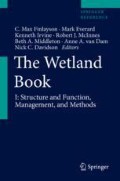Abstract
Since 2010, there has been increasing international interest and activity around “the nexus.” The most common articulation of “the nexus” is recognition of the interlinked issues of water, food and energy (including the challenges of a changing climate). This is often considered in the context of emancipation of the “bottom billion” of the world’s population from multiple, interlinked dimensions of poverty, as expressed in the Millennium Development Goals and their successor Sustainable Development Goals, but also in terms of the resilience of the developed world. The nexus approach recognizes the practical impossibility of effective management of each of these inherently interlinked elements in isolation, representing a practical step from a historically, narrow focus into a more systemic basis for management and decision-making.
References
Allouche, J.. Food, energy and water: the politics of the nexus. 2014. Political Science, The Guardian. [online] http://www.theguardian.com/science/political-science/2014/jun/24/food-energy-water-politics-nexus. Accessed 10 Sep 2014.
Everard M. The hydropolitics of dams: engineering or ecosystems? London: Zed Books; 2013.
Hoff, H. (2011). Understanding the nexus. Background paper for the Bonn 2011 conference: the water, energy and food security nexus. Stockholm Environment Institute, Stockholm. [online] http://www.water-energy-food.org/documents/understanding_the_nexus.pdf. Accessed 10 Sep 2014.
International Rivers. Press release: 4% of global warming due to dams, says new research. International Rivers Network, 9th May 2007; 2007. [online] http://www.internationalrivers.org/node/1361. Accessed 11 Sep 2014.
Lima, I.B.T. et al. Methane emissions from large dams as renewable energy resources: a developing nation perspective. Mitigation and adaptation strategies for global change; 2007. Published on-line March 2007.
UN Water. Water, food and energy nexus. 2014. [online] http://www.unwater.org/topics/water-food-and-energy-nexus/en/. Accessed 11 Sep 2014.
World Bank. Hydropower. 2014. [online] http://www.worldbank.org/en/topic/hydropower. Accessed 11 Sep 2014.
World Business Council for Sustainable Development. Water, energy and climate change: a contribution from the business community. 2009. World Business Council for Sustainable Development. [online] http://www.unwater.org/downloads/WaterEnergyandClimateChange.pdf. Accessed 10 Sep 2014.
World Commission on Dams. Dams and development: a new framework for better decision-making. London: Earthscan; 2000.
Author information
Authors and Affiliations
Corresponding author
Editor information
Editors and Affiliations
Rights and permissions
Copyright information
© 2018 Springer Science+Business Media B.V., part of Springer Nature
About this entry
Cite this entry
Everard, M. (2018). Contribution of Wetlands to the Food-Water-Energy Nexus. In: Finlayson, C.M., et al. The Wetland Book. Springer, Dordrecht. https://doi.org/10.1007/978-90-481-9659-3_161
Download citation
DOI: https://doi.org/10.1007/978-90-481-9659-3_161
Published:
Publisher Name: Springer, Dordrecht
Print ISBN: 978-90-481-3493-9
Online ISBN: 978-90-481-9659-3
eBook Packages: Biomedical and Life SciencesReference Module Biomedical and Life Sciences

